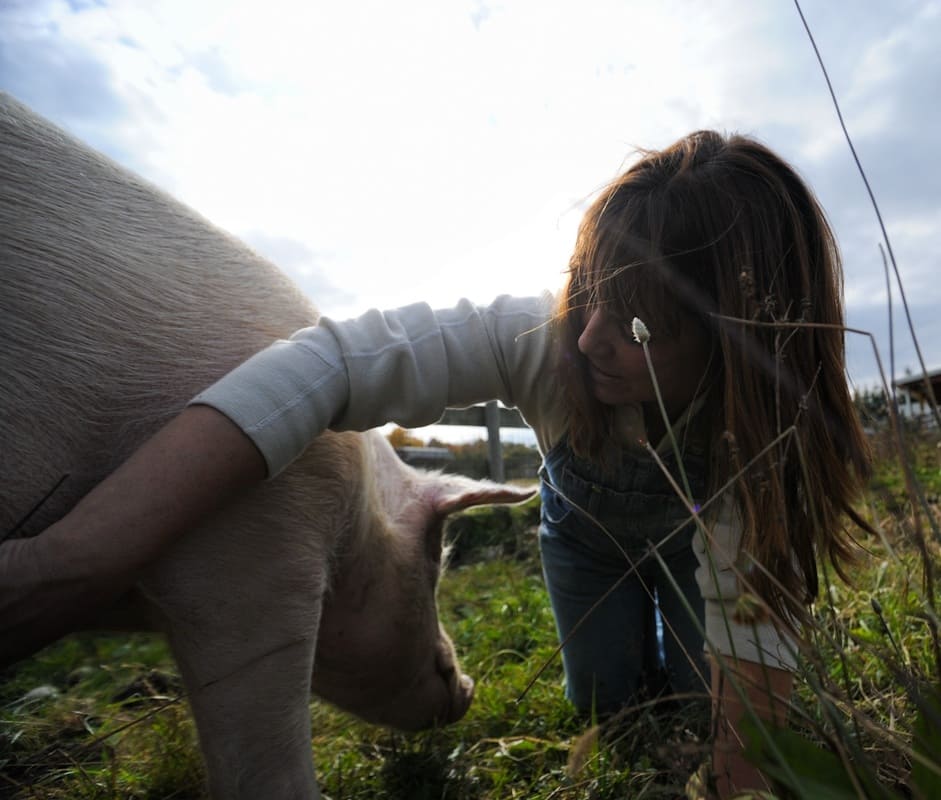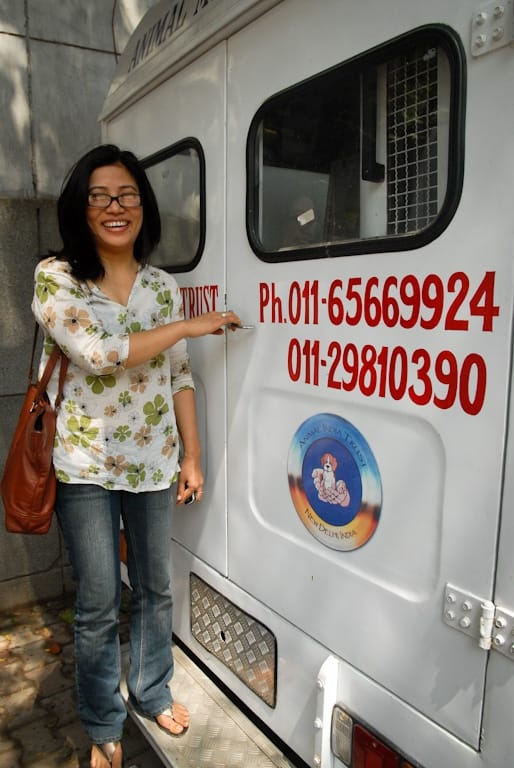Women’s work with animals reveals so much about lives and deaths, about money and power, and about the entanglements of pain, anger, care, happiness, and hope. We should see the diverse threads, but also imagine this collection of work as a tapestry, one with vibrant patterns, along with rips, holes, and patches sewn carefully or hastily, because it was risky or because there simply wasn’t enough time. There are contentious corners, too, and designs that have been covered or cut-out because they were scorned, painful, flawed, or threatening to others.

Susie Coston, National Shelter Director at Farm Sanctuary
Women have worked with animals at all stages of history, across every culture and landscape. Women, and especially working class, poor, rural, and racialized women, have regularly been responsible for unglamorous yet essential daily labour, and often have had to take on the dirtiest and most emotionally-trying tasks. Sadly, many women have also had to “choose” between brutal poverty and an awful job that harms animals.
Some workforce dynamics are shifting, and certain jobs with animals that have historically been male-dominated, like veterinarian, are undergoing gendered changes. Women have held most veterinary technician and nursing positions, but today, in a number of countries, women also comprise the majority of students in veterinary medicine programs — although tuition fees are often high and that affects which women can afford this employment route. How an influx of women will affect veterinary practice, cultures, and advocacy is still to-be-determined.
Overall, many types of work with animals, particularly in caring and protective sectors, are still not well-respected or well-compensated. Nevertheless, among women able to more freely choose their career paths, many are motivated by their love for animals, and they endure low pay, job insecurity, and difficult working conditions because they want to make a difference for individual animals or whole species.
Moreover, much of the work women do with and for animals generates no income at all. The unpaid and often unrecognized work done in homes and families to feed, heal, teach, and empower makes all social and economic activity possibility. Around the world, women continue to perform the majority of this unpaid domestic labour, and often this work involves caring for animals. At the same time, animals assist women in homes and communities of all sizes, by engaging in caring, protective, transportation, and manual work. When women are confronting domestic violence, are homeless, or are precariously-housed, the importance of the companionship and protective work done by animals and dogs in particular cannot be over-stated.
The life-saving political work women do with and for animals is not often paid or well-paid, and is virtually never done with income front-of-mind. Most animal advocacy organizations would not exist in the current political and economic context without the unpaid labour of volunteers, activists, and everyday women who manage to find some time to help. Plus, even in situations of paid employment, it is women who disproportionately take on the boring and demanding tasks, the interpersonal work of tending to others and preventing or mediating disputes, everything that gets forgotten or pushed aside.
This pattern is not unique to animal advocacy work. More women (and progressive men) across workplaces are asking important questions about the distribution of power, credit, and labour of all kinds, including emotional work. That is a much-needed first step.

Dr. Devi, founder of the Animal India Trust, with their mobile clinic in Delhi, India
Yet these are complicated dynamics without easy answers or a single solution. A simple refusal to do unpaid tasks or undervalued jobs won’t suffice – and, as noted, many women do not have a real choice about where they work because of high unemployment and underemployment rates, discrimination, forced migration, and other barriers. Moreover, women who take care of others do so to challenge the very insensitivity and selfishness that helps fuel greed, violence, and suffering within and across species.
Part of the solution requires men to recognize their privileges and their responsibility to share in unpleasant and/or essential caring work in homes and in spaces of paid and unpaid labour. Similarly, we all ought to encourage broader conversations about how to not only recognize but genuinely value those who work to support others. There is potential to forge alliances among women and men who understand the challenges and essentialness of care work, and who can find common cause whether their efforts are currently focused on people, animals, or multispecies connections. Care work, wherever it is done, is at the heart of more caring societies.
Therefore we absolutely must promote new paid jobs and whole employment sectors that are underscored by respect for all sentient beings. In that spirit, I propose an increased commitment to improving, expanding, and creating what I call humane jobs: jobs that benefit both people and animals. Many jobs are lousy for people and even worse for animals, and spaces of paid work are where the most horrific and large-scale violence against animals occurs. So in addition to critique, let’s work towards alternatives.
People needs jobs, and with careful work and political will we can move away from practices that harm people, animals, and the planet, towards positive, healthy, sustainable, and ethical alternatives. Opportunities exist in health care, conservation, humane education, agriculture, cruelty investigations, among other sectors.

Kendra Coulter and Lenny. Photo supplied by Kendra Coulter.
Women have long worked for bread and roses – for the material needs of life, but also for joy, peace, and dignity – for themselves and others. Women deserve nothing less, and so do animals. And neither is possible without work.
Dr. Kendra Coulter is an associate professor in the Centre for Labour Studies at Brock University in Canada where she teaches the unique and popular course “Animals at Work.” An award-winning author, Kendra’s latest book is Animals, Work, and the Promise of Interspecies Solidarity. She is now conducting a path-making multi-year research project on humane jobs funded by the Social Sciences and Humanities Research Council of Canada.
